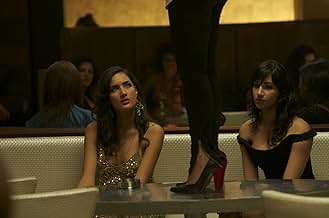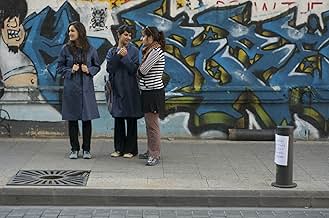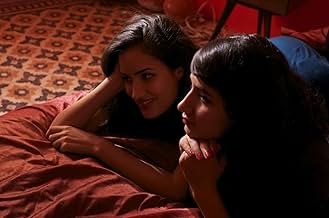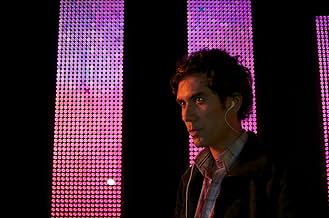CALIFICACIÓN DE IMDb
5.9/10
8.1 k
TU CALIFICACIÓN
Una familia iraní adinerada lucha por contener la creciente rebelión sexual de una adolescente y la peligrosa obsesión de su hermano.Una familia iraní adinerada lucha por contener la creciente rebelión sexual de una adolescente y la peligrosa obsesión de su hermano.Una familia iraní adinerada lucha por contener la creciente rebelión sexual de una adolescente y la peligrosa obsesión de su hermano.
- Premios
- 11 premios ganados y 9 nominaciones en total
Keon Alexander
- Joey
- (as a different name)
Amir Hossein Soleimani
- Payam
- (as Amir Soleimani)
Sirvart Fazlian
- Shireen's Grandmother
- (as Siro Fazlian)
Hadi Tabbal
- Molesting Taxi Driver
- (as Hady Tabbal)
- Dirección
- Guionista
- Todo el elenco y el equipo
- Producción, taquilla y más en IMDbPro
Argumento
¿Sabías que…?
- TriviaNikohl Boosheri's debut.
- ErroresAlmost all actors and actresses in the movie have strong foreign accent and can't speak Persian fluently.
- ConexionesFeatures American Idol (2002)
- Bandas sonorasBach Cello Suite in D Minor
Written by Johann Sebastian Bach (as J.S. Bach)
Performed by Chris Votek (as Christopher Votek)
Produced by Gingger Shankar
Opinión destacada
As an American, I try to read about what the Iranian regime is up to every day. It's a scary, dangerous place, that conjures up images of a police state akin to Nazi Germany. Maryam Keshavarz's new film, Circumstance, attempts to reveal the repressive nature of Iranian society by focusing on the relationship between two teenage school girls from Tehran, Atafeh, who lives with her liberal parents and Shireen, raised by an uncle after her dissident parents presumably were murdered by the Mullahs some time after the Iranian Revolution.
Keshavarz spent some time growing up in Iran but it's my understanding that she's been thoroughly ensconced in the USA for quite some time. In interviews, Keshavarz indicates that she based her script on her some of her own experiences as well as the experiences of some her Iranian relatives. Hence, her narrative appears to be written at a distance, with the resulting storyline full of tasty morsels but never quite arriving at the main course.
We do learn about the rebellious, underground youth culture in Iran and there's an interesting scene where Atafeh and Shireen meet up with some friends including an Iranian-American, who conscripts the girls to participate in the dubbing of the American film, 'Milk', into Farsi. It's perhaps the most humorous scene in the entire movie, as the director chastises one of the participants for sounding "too gay" on the soundtrack.
Also interesting is the role of the 'morality police', as they seek to crush the spirit of the many rebellious youth, dissatisfied with repressive governmental policies. While Atafeh's brother, Mehran, ends up as an informer for the police, I wanted to know much more about how the group operates. Atafeh and Shireen are saved through Mehran's connections but I shudder to think of what happens to innocent citizens who don't have a family member to bail them out.
There were other scenes which I had no way of confirming were true. For example, Atafeh's father's assertion that he looks forward to the day that women can swim in the ocean. Some posters who claimed to be from Iran asserted that women are not prevented from swimming besides men. There was also a scene where an extremely sexually frustrated cabbie masturbates while fondling one of the girl's feet. Again, it's difficult to know whether this type of behavior is the norm in such a conservative society. One scene that did ring true was the arrest of the Iranian-American film director. At one point, we can hear a TV news broadcast in the background which notes the young man's arrest and that he is an American-Israeli agent (it would seem to me that anyone with joint Iranian-American citizenship would be insanely foolish to return to Iran at this juncture in time).
Keshavarz wastes quite a bit of time by focusing on the illicit lesbian relationship between Atafeh and Shireen. I would have much preferred the director to have limited the erotic contact to a minimum as it feels more like what American teenagers might do than the kind of behavior we would expect from Iranian girls, presumably much more shy and conservative, than their American counterparts.
Keshavarz attempts to humanize Mehran, having him break down after his marriage to Shireen and her negative response to him in the sack. That short hint of vulnerability is enough for Shireen to turn a cold shoulder toward Atafeh and suddenly embrace the backward Mehran. Not sure if I bought that sudden character transformation. The same goes for Atafeh and Mehran's father who rejects religion when we first meet him but then joins Mehran, bowing to Mecca on a prayer shawl at film's end.
While the film makes much of scenes of surveillance footage, connoting the Big Brother mentality in Iranian society, what's missing is a more nuanced portrait of the bad guys. What actually was Mehran and his superior doing at the party where Atafeh and her mother were singing together? I hardly think that those type of fanatics could have sat there and listened to women singing unless of course they were there seeking out additional intelligence.
For a first feature, 'Circumstance' is visually quite impressive. In the end, however, it's a film that's more style over substance. What was needed was more of a hard-hitting exposé than the tame domestic drama we end up with here.
Keshavarz spent some time growing up in Iran but it's my understanding that she's been thoroughly ensconced in the USA for quite some time. In interviews, Keshavarz indicates that she based her script on her some of her own experiences as well as the experiences of some her Iranian relatives. Hence, her narrative appears to be written at a distance, with the resulting storyline full of tasty morsels but never quite arriving at the main course.
We do learn about the rebellious, underground youth culture in Iran and there's an interesting scene where Atafeh and Shireen meet up with some friends including an Iranian-American, who conscripts the girls to participate in the dubbing of the American film, 'Milk', into Farsi. It's perhaps the most humorous scene in the entire movie, as the director chastises one of the participants for sounding "too gay" on the soundtrack.
Also interesting is the role of the 'morality police', as they seek to crush the spirit of the many rebellious youth, dissatisfied with repressive governmental policies. While Atafeh's brother, Mehran, ends up as an informer for the police, I wanted to know much more about how the group operates. Atafeh and Shireen are saved through Mehran's connections but I shudder to think of what happens to innocent citizens who don't have a family member to bail them out.
There were other scenes which I had no way of confirming were true. For example, Atafeh's father's assertion that he looks forward to the day that women can swim in the ocean. Some posters who claimed to be from Iran asserted that women are not prevented from swimming besides men. There was also a scene where an extremely sexually frustrated cabbie masturbates while fondling one of the girl's feet. Again, it's difficult to know whether this type of behavior is the norm in such a conservative society. One scene that did ring true was the arrest of the Iranian-American film director. At one point, we can hear a TV news broadcast in the background which notes the young man's arrest and that he is an American-Israeli agent (it would seem to me that anyone with joint Iranian-American citizenship would be insanely foolish to return to Iran at this juncture in time).
Keshavarz wastes quite a bit of time by focusing on the illicit lesbian relationship between Atafeh and Shireen. I would have much preferred the director to have limited the erotic contact to a minimum as it feels more like what American teenagers might do than the kind of behavior we would expect from Iranian girls, presumably much more shy and conservative, than their American counterparts.
Keshavarz attempts to humanize Mehran, having him break down after his marriage to Shireen and her negative response to him in the sack. That short hint of vulnerability is enough for Shireen to turn a cold shoulder toward Atafeh and suddenly embrace the backward Mehran. Not sure if I bought that sudden character transformation. The same goes for Atafeh and Mehran's father who rejects religion when we first meet him but then joins Mehran, bowing to Mecca on a prayer shawl at film's end.
While the film makes much of scenes of surveillance footage, connoting the Big Brother mentality in Iranian society, what's missing is a more nuanced portrait of the bad guys. What actually was Mehran and his superior doing at the party where Atafeh and her mother were singing together? I hardly think that those type of fanatics could have sat there and listened to women singing unless of course they were there seeking out additional intelligence.
For a first feature, 'Circumstance' is visually quite impressive. In the end, however, it's a film that's more style over substance. What was needed was more of a hard-hitting exposé than the tame domestic drama we end up with here.
- Turfseer
- 16 ene 2012
- Enlace permanente
Selecciones populares
Inicia sesión para calificar y agrega a la lista de videos para obtener recomendaciones personalizadas
- How long is Circumstance?Con tecnología de Alexa
Detalles
- Fecha de lanzamiento
- Países de origen
- Sitios oficiales
- Idiomas
- También se conoce como
- Koşul
- Locaciones de filmación
- Productoras
- Ver más créditos de la compañía en IMDbPro
Taquilla
- Presupuesto
- USD 1,000,000 (estimado)
- Total en EE. UU. y Canadá
- USD 454,121
- Fin de semana de estreno en EE. UU. y Canadá
- USD 43,318
- 28 ago 2011
- Total a nivel mundial
- USD 555,511
Contribuir a esta página
Sugiere una edición o agrega el contenido que falta

Principales brechas de datos
What was the official certification given to Circumstance (2011) in France?
Responda


























